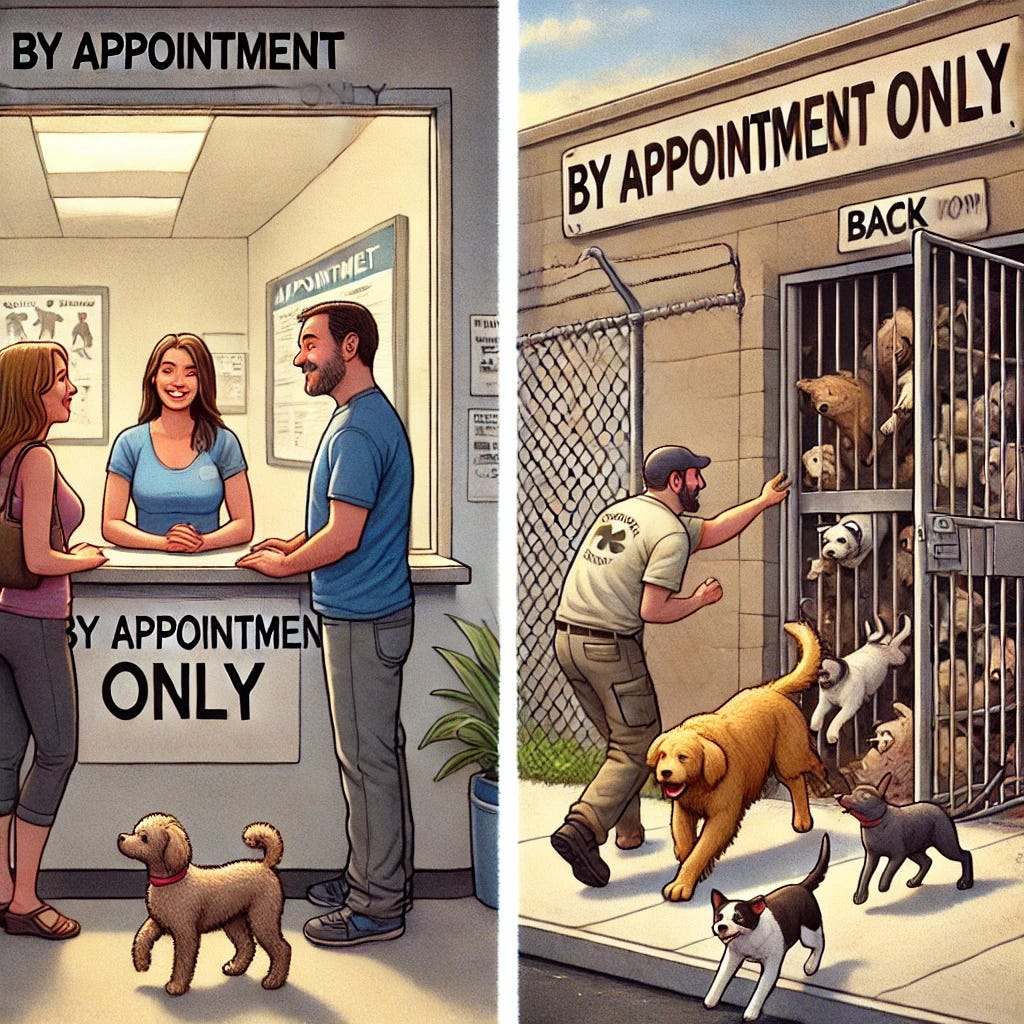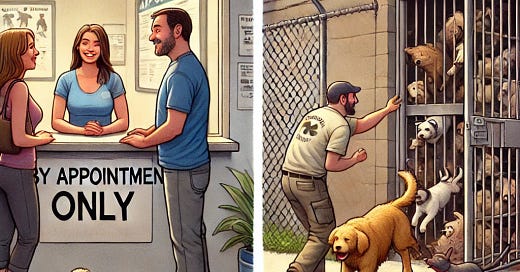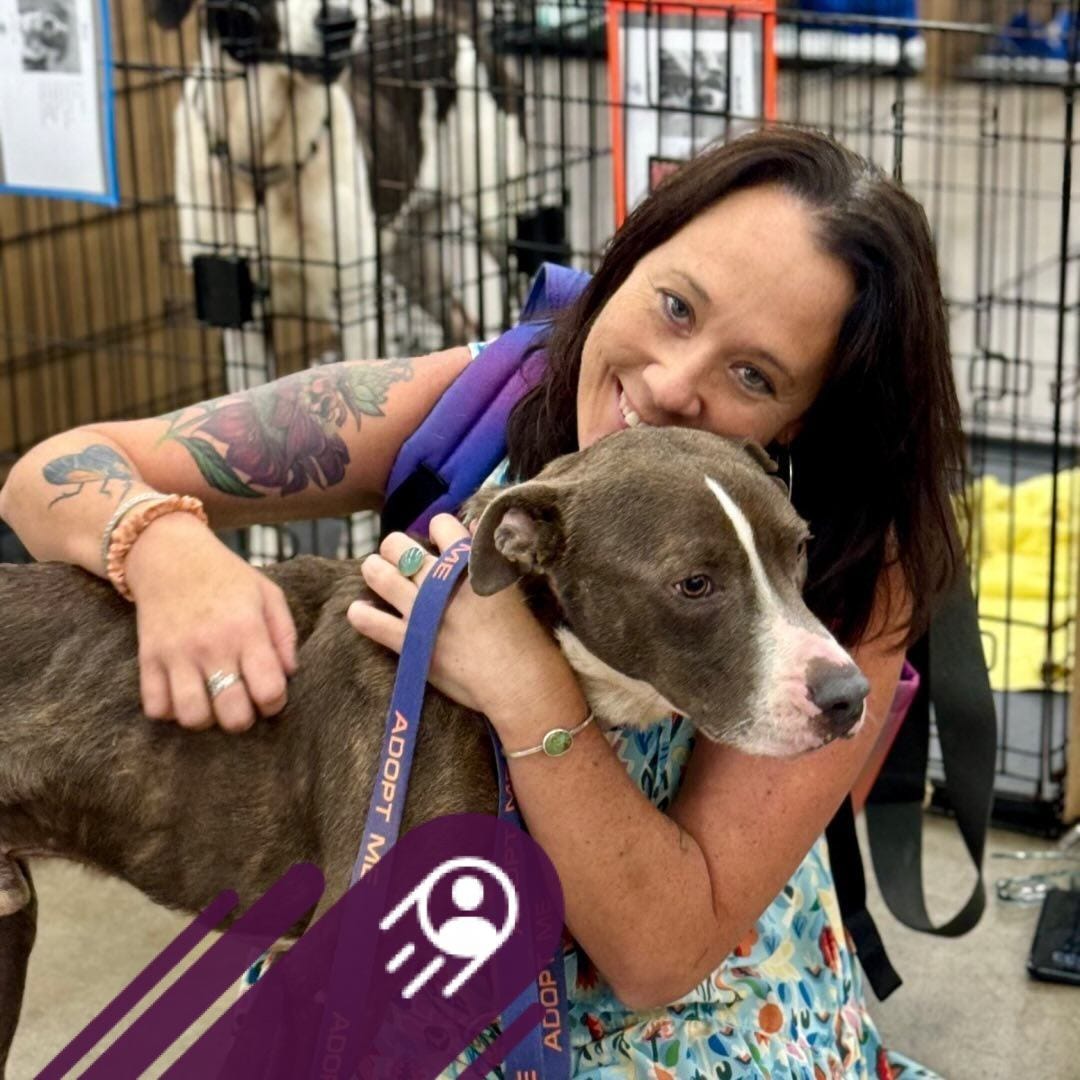LA's Dangerous Gamble: Are Homeless Animals Pawns in a Numbers Game?
How Managed Intake and Community Animal Programs May Undermine Animal Welfare and Public Safety
The recent decision by the City of Los Angeles to contract Kristen Hassen as a consultant for Los Angeles Animal Services (LAAS) has sparked intense debate in the animal welfare community. Hassen, a well-known figure in the field, has close ties to Best Friends Animal Society and a track record of controversy. While her supporters claim she champions progressive reforms, her critics argue that her strategies—especially managed intake and the release of community animals—prioritize optics over genuine animal welfare.
Controversial Contract Awards
Concerns have arisen over how Hassen's contract was awarded. The consulting fee was set at $24,995, reportedly to circumvent the requirement for competitive bidding on contracts exceeding $25,000. This raises questions about transparency and adherence to city regulations. Additionally, Hassen's involvement in the committee approving the new General Manager presents a conflict of interest.
Adding to the controversy, it has been reported that Riverside County awarded Hassen a $2.4 million single-source contract, which has sparked considerable outrage. Critics argue that such large contracts without competitive bidding undermine public trust and accountability. These financial decisions, combined with Hassen's close ties to Best Friends Animal Society, heighten concerns about potential ethical breaches and the prioritization of financial interests over genuine animal welfare.
As Los Angeles moves forward with this consulting arrangement, it is imperative for city officials to ensure robust oversight and accountability to prevent any unethical practices from taking root. Both Los Angeles and Riverside County need strong executive directors to manage Hassen effectively and reassure the community that operations are conducted transparently and ethically.
Who is Kristen Hassen?
Kristen Hassen has held prominent roles in the animal welfare sector, including leadership at Austin Pets Alive! and Pima Animal Care Center. She currently runs Outcomes for Pets Consulting, LLC. Her strategies are lauded by some for being data-driven and community-focused, but many claim they come at the expense of public safety and genuine animal care.
One of the most contentious issues with Hassen’s approach is her reliance on managed intake, which limits the number of animals entering shelters, and the release of community animals—a method she touts as forward-thinking but which many see as irresponsible. Critics argue that these tactics have a dark side: they inflate "positive" shelter outcomes by reducing intake numbers and euthanasia rates, but do little to help animals in real need or ensure public safety.
What is Managed Intake?
Managed intake is a strategy used by some animal shelters to limit the number of animals they accept. Rather than taking in every animal brought to a shelter, facilities control when and how animals enter. In theory, this allows shelters to avoid overcrowding and ensures that they can provide proper care for the animals they house.
However, in practice, critics of Hassen’s approach claim that managed intake can lead to animals being left in harmful situations. Some argue that shelters are merely turning animals away or placing them back on the streets under the guise of community animal programs. This can result in dangerous situations where stray animals, including those with medical or behavioral issues, are left without the care they need, which not only jeopardizes their welfare but also creates public safety concerns.
Community Animals: The Wrong Solution?
One of Hassen's most divisive strategies is the concept of "community animals"—free-roaming cats and dogs that are released back into the community after basic health checks, if any. This method, inspired by her observations of free-roaming dogs in Mexico, posits that homeless dogs and cats can live harmoniously within human communities without the need for conventional sheltering.
Hassen publicly praised Mexico's approach to free-roaming dogs, noting how animals in these areas often roam freely and peacefully co-exist with humans and other animals. But applying this model to U.S. cities like Los Angeles has raised alarms. In one notable case, under the alleged direction of an embedded Best Friends employee at the Humane Society of Southern Arizona (HSSA), hundreds of cats from an overcrowded shelter were labeled as "community cats" and released into the harsh Arizona desert, where survival chances were grim.
The question for Los Angeles officials is clear: Will animals be subjected to similar outcomes under Hassen's and Best Friends’ guidance? The release of animals into urban environments without proper care and support can create an array of problems—from increased risks of disease transmission to the creation of dangerous situations for residents and wildlife alike.

Data Manipulation: Playing the Numbers Game
Hassen’s critics argue that the focus on managed intake and community animals is not about better outcomes for animals, but about manipulating shelter statistics. By reducing the number of animals entering shelters and inflating the number of "live releases" through reclassification as community animals, Hassen’s strategies can give the appearance of success without addressing the underlying issues of animal neglect and overpopulation.
This numbers-driven approach raises broader questions about transparency and accountability. If public safety and animal welfare are sacrificed in the name of improving statistics, how can these programs claim to be truly serving the community?
Appointment-Only Adoptions: Another Barrier
In addition to managed intake, Hassen is known for championing an appointment-only adoption process. Modeled after retail clinics like CVS, this system requires potential adopters to register online, fill out questionnaires, and pre-pay with credit cards before meeting selected animals. Critics argue that this method creates unnecessary barriers to adoption, reducing the number of animals finding homes and excluding people who are less tech-savvy or financially constrained. Moreover, it limits transparency by reducing public access to shelters and curtails opportunities for potential adopters to meet a variety of animals.
LA’s Challenge: Ensuring Accountability
The decision to hire Hassen comes at a time when Best Friends Animal Society is proposing to take on a more active role in LAAS operations. The organization has been accused of similar strategies in other cities—managing intake to keep shelters artificially "low-kill" without truly addressing the needs of animals or communities. With these concerns in mind, many fear that Hassen’s involvement will exacerbate existing problems rather than resolve them.
For Los Angeles, transparency and accountability will be critical in the months ahead. City officials must closely monitor Hassen's consulting work to ensure that it aligns with the city’s goals for animal welfare, public safety, and community engagement. Without careful oversight, there is a risk that the same issues seen in Austin and Pima County could repeat themselves in Los Angeles.
Legal Criticisms
Palm Springs attorney, Dan Bolton, who has taken an active interest in the matter, states, "Hassen's philosophy is straight out of the 1800s." Sharon Logan, a longtime animal activist who successfully sued Orange County Animal Care, expressed strong opposition, stating, "In my view, Hassen's model prioritizes business metrics over animal welfare, leaving devastation in its wake."
This legal scrutiny reinforces the need for a careful balance between innovation and accountability in managing LA's animal welfare system. As Los Angeles grapples with its animal welfare crisis, it must ensure that any new approaches genuinely serve both the animals and the community, without cutting corners or undermining the trust of the public.
True Leadership Needed
Kristen Hassen’s consulting contract presents a pivotal moment for animal welfare in Los Angeles. As the city moves forward, it must ensure that strategies are grounded in accountability, compassion, and real problem-solving—not in statistical manipulation or self-promotion.
Call to Action
To ensure transparency and accountability, LAAS could take several concrete steps:
Appoint independent auditors to regularly review operations and outcomes to provide unbiased oversight and restore public trust.
Implement a public reporting platform with real-time shelter data to enhance transparency and enable community monitoring.
Establish a community oversight committee to offer diverse input and ensure that policies prioritize both animal welfare and public safety.
Host regular public forums to allow citizens to voice concerns.
Set clear performance benchmarks to hold LAAS and consultants accountable for results.
Expand access to low-cost spay/neuter programs to help reduce the stray population and alleviate shelter pressures.
These steps will create a more accountable, transparent, and effective animal welfare system. The animals and people of Los Angeles deserve nothing less than a transparent, responsible approach to shelter management that prioritizes both their well-being and public safety.
Ed Boks is a former Executive Director of the New York City, Los Angeles, and Maricopa County Animal Care & Control Departments. His work has been published in the LA Times, New York Times, Newsweek, Real Clear Policy, Sentient Media, and now on Animal Politics with Ed Boks. He is available for consultations at animalpolitics8@gmail.com






My reccomendation to RCDASZ Is to cancel the contract with KH this was fiscally irresponsible. Especially as they have had people more than experienced and qualified for years offering services but they go with In my opinion this train wreck.
Proposal for Enhancing County-Funded Municipal Sheltering: A Path to Reducing Euthanasia Rates and Strengthening Community Support
In recent years, our county’s municipal shelter system has faced increasing pressure, with rising euthanasia rates and growing challenges related to overcrowding, resource limitations, and a lack of community support. The current system does not fully address the needs of our community, leading to preventable euthanasia of healthy, adoptable pets and placing further strain on vulnerable pet owners, especially those who are housing-insecure or unhoused. Additionally, irresponsible ownership, lack of enforcement of existing rules, and selective enforcement have contributed to overpopulation and animal welfare crises. **Cultural competency**, enforcement of laws equitably, and the **need for decolonial education**, particularly with **indigenous populations**, are essential components of the reform plan.
We propose a comprehensive sheltering reform, supported by a **$2.5 million investment**, that will not only save lives but also create a healthier, more sustainable community for pets and their guardians.
This plan focuses on nine core pillars that can reshape how our county shelters operate, ultimately reducing euthanasia rates, increasing adoptions, and providing essential resources to pet owners in need. The proposal outlines the urgent need to address the municipal shelter crisis through responsible investments that prioritize **cultural competency**, **decolonization principles**, **community engagement**, and **strong enforcement of existing laws**.
---
### Enforcement of Animal Abuse and Neglect Laws
One of the key gaps in our current shelter and community animal welfare system is the **lack of consistent enforcement of animal abuse and neglect laws** that are already in place. **Selective enforcement** not only allows irresponsible pet ownership and neglect to go unchecked but also disproportionately affects marginalized communities, contributing to overpopulation, hoarding, neglect, and abuse cases.
#### Addressing Selective Enforcement and Abuse of Authority
Currently, many instances of enforcement involve **inconsistent application of the law**, with some individuals facing harsh penalties while others, often with connections to breeders or influential entities, experience leniency or no consequences at all. This abuse of authority **erodes public trust** in animal control and law enforcement agencies. To address this issue, it is critical that the county:
1. **Implement accountability measures** to ensure fair, transparent, and equitable enforcement of all animal abuse and neglect laws.
2. **Establish an oversight committee** made up of community representatives, animal welfare advocates, and legal experts to review enforcement actions, investigate claims of abuse of authority, and provide regular reports on enforcement practices.
3. **Mandate transparency in decision-making** related to the investigation and prosecution of animal abuse and neglect cases, ensuring that all cases are handled equitably and according to the law.
---
### Key Pillars for Shelter Reform
1. **Open Intake: Reversing the Harm of Managed Intake**
Open intake policies will ensure no animal is turned away, allowing better rehabilitation, adoption, and owner reunification. This will involve hiring additional staff, expanding shelter capacity, and improving intake processes.
2. **Improved Access to Training and Behavior Resources**
Behavioral issues often lead to pet relinquishment. By providing accessible behavior support services, we can reduce surrenders and promote successful adoptions.
3. **Fear-Free Sheltering Practices**
Implementing stress-reducing practices like positive reinforcement and enrichment will improve the well-being of shelter animals, reducing illness and improving adoption outcomes.
4. **Staff Development on ASVAB Standards and through Programs like the Shelter Playgroup Alliance**
Proper training in animal behavior and veterinary care will improve animal health, reduce euthanasia rates, and increase adoption opportunities.
5. **Preventative Care for Shelter Animals**
Regular health screenings, vaccinations, and preventative care will reduce shelter overcrowding due to illness and increase the number of animals ready for adoption.
6. **Subsidized Spay and Neuter Programs**
Partnering with veterinary schools and organizations will help prevent overpopulation, reducing the number of animals entering shelters and preventing diseases.
7. **Community Support for Pet and Human Needs**
Establishing a pet food pantry and support network will provide essential resources to pet owners in crisis, keeping families and pets together.
8. **Short-Term Boarding for Medical Crises**
A boarding program for housing-insecure pet owners facing medical emergencies will prevent unnecessary pet surrenders during short-term crises.
9. **Housing Access for Unhoused Pet Parents**
Partnering with housing organizations to create pet-friendly shelters and policies will support housing-insecure and unhoused pet owners, improving housing access and keeping pets with their guardians.
---
### Cultural Competency and Decolonial Practices
The shelter reform plan acknowledges that **rescues and animal control practices** have historically harmed underrepresented and marginalized communities. **Communities of color** and **indigenous populations** have often been excluded from decision-making processes related to animal welfare. **Decolonial education** and **culturally competent** approaches are critical for creating an inclusive sheltering framework that recognizes and respects the cultural values and needs of all residents.
---
### Transparency and Accountability
A critical component of shelter reform involves **public data transparency**. Recently, RCDAS has stopped providing public access to shelter impound and outcome records, which contradicts principles of transparency. This proposal urges the **Riverside County Animal Campus Commission** to restore public access to these records. The community deserves oversight and accountability to ensure that resources are effectively used, and animals are given the best chance at life.
---
### Why $2.5 Million is Critical for Change
This investment is not just an expenditure—it’s an opportunity to save lives, reduce suffering, and create a more humane and sustainable community. Allocating the funds will strengthen shelter operations, enforce existing rules, and ensure equitable access to resources for all residents, while addressing overpopulation, hoarding, and neglect issues.
Together, with responsible leadership, transparency, **fair enforcement**, and community-driven solutions, we can transform the shelter system into one that reflects the values of the people.
https://www.change.org/p/demand-termination-of-the-riverside-county-department-of-animal-services-contract
Perhaps Ms Hassen should take a trip to Egypt and see the results of too many unneutered animals roaming the intensely busy streets of Cairo. Hit by cars, treated cruelly by some people, producing litter after litter that will suffer the same fate.
I have many friends throughout Egypt who do amazing work to help many animals who are literally starving but the numbers are overwhelming.
Seems to me that taking in every animal that comes through the doors of these shelters would do better being evaluated rather than thrust back out into a hostile environment!! Would that result in more euthanasia? Yes, but what is more compassionate!